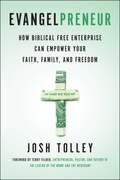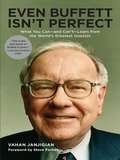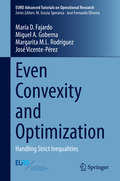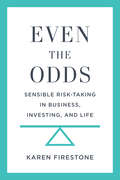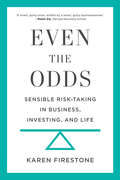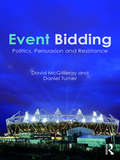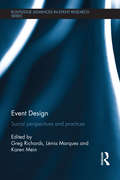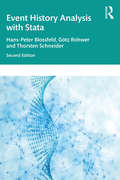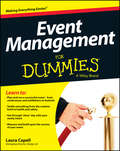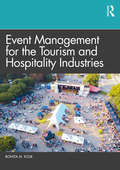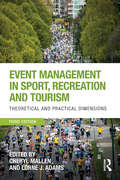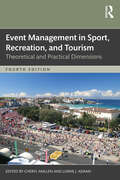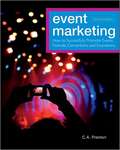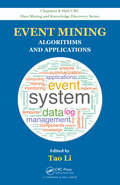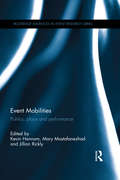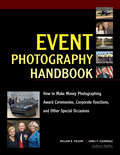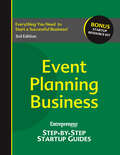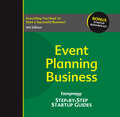- Table View
- List View
Evangelpreneur, Revised and Expanded Edition: How Biblical Free Enterprise Can Empower Your Faith, Family, and Freedom
by Josh TolleyThe truth shall set you free. Ignoring it will cost you a fortune. It has become clear that we are living a lie, and it has brought devastating results: Bankruptcy among churchgoers is equally as high as those who don't attend. Financial misconduct is destroying marriages, families, individuals, and churches. A record number of churches are in foreclosure. The church teaches us it's normal to have student loans, car payments, mortgages, and credit cards. It calls poverty a curse but isn't doing much to correct the problem, and it focuses on tithing and the elimination of personal debt—but debt elimination is not enough. Wouldn't you rather thrive in your finances and live the life God has called you to? Evangelpreneur will teach you: How to get your financial life to line up with your faith life How to save your family and your church from financial ruin How to recognize if God is calling you to entrepreneurship How to use proper financial practices to lead people to salvation and do God's work on earth For too long, the faithful have been held hostage by false teaching, bad teaching, and the poor practice of good teaching. It's time to break free from the bondage tied to financial issues and become an Evangelpreneur.
Evans Food
by Sunil GuptaIn April 2014, Hector Guerra (GMP 16) was discussing his company's dilemma with his living group of the General Management Program (GMP) at the Harvard Business School. Guerra was Vice President of Operations at Evans Food, a $100 million company, which produced pork rinds - salty snacks made out of pork skin - and sold at some of the largest US retailers such as HEB, Meijer, ALDI and Wal-Mart. In the last few years, the cost of pork skin had increased dramatically but Evans Food's selling price to its customers had not kept pace with the increase in raw material costs. The company was losing money on some of the largest accounts but it seemed difficult, if not impossible, to seek price increase from multibillion-dollar retailers.
Eve Hall: The African American Investment Fund in Milwaukee
by Steven RogersThe case highlights the role of minority chambers of commerce and the background of Eve Hall, a well-regarded multi-sector leader asked to revive Wisconsin's African-American chamber. This case study examines the lending options that a minority chamber of commerce considers when seeking to maximize value to its constituency. Students learn the challenges minority small business owners and entrepreneurs face, the role of non-financial institutions/community-based organizations in addressing those challenges, and the financial tools available to lenders and borrowers in this segment. Students learn how to analyze financing opportunities by assessing the value propositions of chambers of commerce, developing the risk-reward profile of each party involved, and deliberating as members of a board to reach a final lending decision. Teaching Note for HBS No. 317-076.
Even Bigger Change: A Framework for Getting Started at Changing the World
by Rosabeth Moss KanterPresents a framework for leading change in institutions or society, showing leaders how to manage political, economic, or social change by mapping their targets (policy, programs, or people/culture) and choice of action vehicle (single organizations or coalitions of organizations).
Even Buffett Isn't Perfect
by Vahan JanjigianA contrarian look at how Warren Buffett thinks about investing and related issues Warren Buffett is the most successful and revered investor of all time. His ability to consistently find undervalued companies has made him one of the world’s richest men. Despite many previous books about him, it’s rare to find an objective assessment-one that praises him when appropriate, but also recognizes that even Buffett makes mistakes. For instance, is he right to call for higher taxes and an end to earnings guidance? Should Buffett fans copy his avoidance of technology stocks? In this penetrating look at how Buffett thinks, Vahan Janjigian shows readers how to learn from the master’s best moves while avoiding strategies that don’t apply to small investors. And he explains Buffett’s favorite valuation methodology, the discounted cash flow model, and how it can significantly reduce the odds of overpaying for a stock. .
Even Convexity and Optimization: Handling Strict Inequalities (EURO Advanced Tutorials on Operational Research)
by Miguel A. Goberna Margarita M.L. Rodríguez María D. Fajardo José Vicente-PérezThis tutorial is the first comprehensive introduction to (possibly infinite) linear systems containing strict inequalities and evenly convex sets. The book introduces their application to convex optimization. Particular attention is paid to evenly convex polyhedra and finite linear systems containing strict inequalities. The book also analyzes evenly convex and quasiconvex functions from a conjugacy and duality perspective. It discusses the applications of these functions in economics. Written in an expository style the main concepts and basic results are illustrated with suitable examples and figures..
Even Swaps: A Rational Method for Making Trade-Offs
by John S. Hammond Ralph L. Keeney Howard RaiffaThis article offers insight to any decision maker struggling with a hard choice. Making wise trade-offs is one of the most important and difficult challenges in decision making. The sheer volume of trade-offs, however, is not what makes decision making so hard. It's the fact that each objective has its own basis of comparison, from precise numbers (34% versus 38%) to relationships (high versus low) to descriptive terms (red versus blue). You're not just trading off apples and oranges; you're trading off apples and oranges and elephants. How do you make trade-offs when comparing widely disparate things? In the past, decision makers have relied mostly on instinct, common sense, and guesswork. They've lacked a clear, rational, and easy-to-use trade-off methodology. To help fill that gap, Howard Raiffa, a professor emeritus at Harvard University, John Hammond, a Boston-area consultant, and Ralph Keeney, a professor of systems management at the University of Southern California have developed a system--which they call even swaps--that provides a practical way of making trade-offs among a range of objectives across a range of alternatives. The even-swap method will not make complex decisions easy; you'll still have to make hard choices about the values you set and the trades you make. What it does provide is a reliable mechanism for making trades and a coherent framework in which to make them.
Even the Odds: Sensible Risk-Taking in Business, Investing, and Life
by Karen FirestoneIn Even the Odds, Karen Firestone explains how risk assessment plays a prominent role in all aspects of life. We may all define risk, and our tolerance for it, somewhat differently, but we might all agree it plays a pivotal role in guiding us toward an optimal outcome. As a long-time investment advisor, Firestone has grown accustomed to interpreting risk on a daily basis. She has developed four core tenets of risk-taking we can all apply to anticipating, evaluating, and responding to the risks we face in our business, investing, and personal lives. These tenets are right-sizing; right-timing; relying on skill, knowledge, and experience; and staying skeptical about numbers, promises, and forecasts. Firestone's approach is both practical and accessible to individuals who are making important decisions, such as embarking on new career or life changes, starting or running an enterprise, making a sizable investment, or deciding how to balance across a full portfolio of assets. The book is rich with anecdotes and examples of how many prominent leaders in their fields encountered and dealt with risk along the way. Firestone also shares her own successes and failures, in particular when she decided to risk it all--a fabulous career managing billions of dollars at a premium investment company, her reputation, and the security at home that comes with a strong and stable job--to go out on her own. Even the Odds helps us understand the broader implications of risk--and how it guides our decision-making--so that we can improve outcomes across multiple facets of our lives, from our businesses and investments, to the personal choices we make.
Even the Odds: Sensible Risk-Taking in Business, Investing, and Life
by Karen FirestoneIn Even the Odds, Karen Firestone explains how risk assessment plays a prominent role in all aspects of life. We may all define risk, and our tolerance for it, somewhat differently, but we might all agree it plays a pivotal role in guiding us toward an optimal outcome. As a long-time investment advisor, Firestone has grown accustomed to interpreting risk on a daily basis. She has developed four core tenets of risk-taking we can all apply to anticipating, evaluating, and responding to the risks we face in our business, investing, and personal lives. These tenets are right-sizing; right-timing; relying on skill, knowledge, and experience; and staying skeptical about numbers, promises, and forecasts. Firestone's approach is both practical and accessible to individuals who are making important decisions, such as embarking on new career or life changes, starting or running an enterprise, making a sizable investment, or deciding how to balance across a full portfolio of assets. The book is rich with anecdotes and examples of how many prominent leaders in their fields encountered and dealt with risk along the way. Firestone also shares her own successes and failures, in particular when she decided to risk it all--a fabulous career managing billions of dollars at a premium investment company, her reputation, and the security at home that comes with a strong and stable job--to go out on her own. Even the Odds helps us understand the broader implications of risk--and how it guides our decision-making--so that we can improve outcomes across multiple facets of our lives, from our businesses and investments, to the personal choices we make.
Evening's Empire: The Story of My Father's Murder
by Zachary LazarWhen he was just six years old, Zachary Lazar's father, Edward, was shot dead by hit men in a Phoenix, Arizona parking garage. The year was 1975, a time when, according to the Arizona Republic, "land-fraud artists roamed the state in sharp suits, gouging money from buyers and investors." How did his father fit into this world and how could his son ever truly understand the man, his time and place, and his motivations? In Evening's Empire, Zachary Lazar, whose novel Sway was named one of the Best Books of 2008 by Rolling Stone, the Los Angeles Times, and other publications, brilliantly attempts to reconstruct the sequence of events that led to his father's murder. How did Ed Lazar, a fun-loving but meticulous accountant, become involved in a multi-million dollar real-estate scandal involving politicians and Mafia figures? How much did he know about his colleagues' illegal activities? Why had he chosen to testify against his former business partner, Ned Warren, Sr.? Warren was "a mystery man," according to 60 Minutes, widely known as "the Godfather of land fraud." The day before Ed Lazar was scheduled to appear in front of a grand jury he was killed in a "gangland-style murder," as reported by Walter Cronkite on the CBS Evening News. Four hundred mourners attended a memorial service for him the next day. Evening's Empire is based on archival research and interviews--introducing a cast of characters as various as Senator Barry Goldwater and Cesar Romero--and is clarified by scenes imagined in the context of this evidence. It is a singular and haunting story of American ambition and its tragic cost. Of Zachary Lazar's previous book, Sway, the reviewer for The New York Times Book Review wrote, "This brilliant novel is about what's to be found in the shadows." The same can be said of Evening's Empire's true story, but here the shadows are very close to home.
Event Bidding: Politics, Persuasion and Resistance
by David McGillivray Daniel TurnerBidding contests for sporting and cultural events are attracting increasing media and public attention. Yet, despite the cost, size and scale of these bidding contests, relatively little academic attention has been paid to the strategies and tactics used to develop successful bids. Event Bidding: Politics, Persuasion and Resistance develops a comprehensive, critical understanding of the bidding processes surrounding the award of major peripatetic events. This is achieved by drawing together existing knowledge on the subject of event bidding, combining this with historical and contemporary examples to enable a critical commentary on the bidding process itself and the struggle for power that it represents. The text draws on case studies of ‘mega events’ including the FIFA World Cup and the Olympic Games as well as a range of smaller peripatetic events from across the world to analyse the bidding process and some of the increasingly controversial issues which emerge during often lengthy and expensive bid campaigns. Finally, the text reflects on a range of critical issues of contemporary significance in bidding contests, including the growing ethical and governance issues surrounding the development and award of events as well as the impact of growing oppositional movements surrounding each contest. This timely volume brings theory and practice together in one place to produce a critical appraisal of a phenomenon with a relatively recent history and is particularly suitable for students, researchers and academics of sports, events, tourism and related subject fields focusing on the strategic and political dimensions of major events.
Event Design: Social perspectives and practices (Routledge Advances in Event Research Series)
by Greg Richards Lénia Marques Karen MeinEvents are becoming more complex as their range of functions grows, as meeting places, creative spaces, economic catalysts, social drivers, community builders, image makers, business forums and network nodes. Effective design can produce more successful business models that can help to sustain cultural and sporting activities even in difficult economic times. This process requires creative imagination, and a design methodology or in other words ‘imagineering’. This book brings together a wide range of international experts in the fields of events, design and imagineering to examine the event design process. It explores the entire event experience from conception and production to consumption and co-creation. By doing so it offers insight into effective strategies for coping with the shift in value creation away from transactional economic value towards social and relational value which benefit a range of stakeholders from the community to policy makers. Mega-events, small community events, business events and festivals in eight different countries are examined providing an international view of social issues in event design.A wide selection of current research perspectives is employed, integrating both theoretical and applied contributions. The multidisciplinary nature of the material means that it will appeal to a broad academic audience, such as art and design, cultural studies, tourism, events studies, sociology and hospitality.
Event History Analysis With Stata: 2nd Edition
by Thorsten Schneider Hans-Peter Blossfeld Gotz RohwerNowadays, event history analysis can draw on a well-established set of statistical tools for the description and causal analysis of event history data. The second edition of Event History Analysis with Stata provides an updated introduction to event history modeling, along with many instructive Stata examples. Using the latest Stata software, each of these practical examples develops a research question, refers to useful substantive background information, gives a short exposition of the underlying statistical concepts, describes the organization of the input data and the application of the statistical Stata procedures, and assists the reader in performing a substantive interpretation of the obtained results. Emphasising the strengths and limitations of event history model techniques in each field of application, this book demonstrates that event history models provide a useful approach with which to uncover causal relationships or to map out a system of causal relations. It demonstrates how long-term processes can be studied and how changing context information on the micro, meso, and macro levels can be integrated easily into a dynamic analysis of longitudinal data. Event History Analysis with Stata is an invaluable resource for both novice students and researchers who need an introductory textbook and experienced researchers (from sociology, economics, political science, pedagogy, psychology, or demography) who are looking for a practical handbook for their research.
Event Impact
by John Armbrecht Tommy D. AnderssonEvents are increasingly used instrumentally to achieve goals of society such as cultural development, destination branding or economic development. Event impacts are, however, routinely measured from a purely economic perspective. Event Impact fills an important niche and a void in the literature on events by taking a holistic approach, incorporating issues like value creation, experiential value, value measurement, sustainability and impact assessment. It is one of the first books devoted to comprehensively dealing with the subject of event impacts, combining the ideas of an international group of academics to tackle an expanding area of research that cannot be met by the work of a single researcher. Methodological concepts such as triple impact assessment, cost–benefit analysis, travel cost method and Q-sort are combined, applied and tested in an event context, creating a unique book that broadens and deepens our knowledge about event impacts theoretically, methodologically as well as empirically. This book was originally published as a special issue of the Scandinavian Journal of Hospitality and Tourism.
Event Management For Dummies
by Laura CapellWhether you want to break into this burgeoning industry, or you simply need to plan an event and don't know where to start, there's something for all would-be event planners in Event Management For Dummies. Packed with tips, hints and checklists, it covers all aspects of planning and running an event - from budgeting, scheduling and promotion, to finding the location, sorting security, health and safety, and much more. Open the book and find: Planning, budgeting and strategy Guests and target audience Promoting and marketing events Location, venue and travel logistics Food, drink, entertainment and themes Security, health and safety, permissions, insurance and the like Tips for building a career in event management
Event Management for the Tourism and Hospitality Industries
by Bonita M. KolbEvent Management for the Tourism and Hospitality Industries provides a theoretical and practical approach to teach students of Tourism and Hospitality the basics of planning, managing and evaluating all types of events. Chapters cover skills such as visitor segmentation, product analysis, developing a budget, promotion and after-event assessment. Special emphasis is placed on critical issues now facing event managers such as environmental sustainability and awareness of cultural diversity, technology and community engagement. The reader will learn the necessity of connecting events with the community heritage and culture to provide the local, personalized experienced desired by visitors. Each chapter covers a unique step in the planning process and corresponds to a section of a detailed event plan outline found at the end of the book that can be submitted as a semester-long assignment. Making use of international case studies in every chapter, this book provides real-world examples to contextualize the information given. This will be essential reading for all Tourism and Hospitality students with an interest in Events Management and Design, and for practitioners employed in tour companies, cruise ships, destination management organizations and cultural festivals.
Event Management in Sport, Recreation and Tourism: Theoretical and Practical Dimensions
by Cheryl Mallen Lorne J. AdamsNow in a fully revised and updated third edition, Event Management in Sport, Recreation and Tourism provides a comprehensive theoretical and practical framework for planning and managing events. Focusing on the role of event managers and their diverse responsibilities through each phase of the event planning process, this is still the only textbook to define the concept of knowledge in the context of event management, placing it at the centre of professional practice. Designed to encourage critical thinking on the part of the student, this book helps them develop the skills that they will need to become effective and reflective practitioners in the events industry. Containing a rich array of international real-world case studies, data and practical examples from sport, recreation and tourism contexts, this third edition is also enhanced by two completely new chapters on contemporary management issues and ethics in event management. Event Management in Sport, Recreation and Tourism is essential reading for any student or practitioner working in event management, sport management, leisure management, outdoor recreation or tourism.
Event Management in Sport, Recreation and Tourism: Theoretical and Practical Dimensions
by Rika NakazawaNow in a fully revised and updated fourth edition, Event Management in Sport, Recreation, and Tourism provides a comprehensive theoretical and practical framework for planning and managing events at all levels, from smaller local events to mega-events. Focusing on the role of event manager and their diverse facilitation responsibilities through each phase of the event planning process, the book is designed to encourage critical thinking, to help the reader to become an adaptable and capable manager ready to cope with the constantly evolving challenges of the contemporary events landscape. The book begins with an updated chapter on the types of knowledge in event management, posing questions that help readers to understand their current knowledge, to decide what they need to pursue, and to advance their knowledge strategies. Containing a rich array of international, real-world case studies, data, and practical examples, from traditional and niche sport, recreation, and tourism contexts, this fourth edition is enhanced by a completely new chapter on practical advances in environmental sustainability that provides an overview of research as well as strategies for moving forward. The book goes further than any other event management textbook in placing social, ethical, and environmental responsibilities at the centre of the event planning process. Event Management in Sport, Recreation, and Tourism is an essential reading for any student or practitioner working in event management, sport management, leisure management, outdoor recreation, or tourism.
Event Marketing: How to Successfully Promote Events, Festivals, Conventions, and Expositions (Wiley Event Management)
by C. A. PrestonAs the events market becomes increasingly saturated, it is essential for a successful event professional to understand the use of strategic marketing plans. Events are everywhere—in the U.S. alone, there are more than 2,500 music festivals a year, for example, while the UK hosts over 70 different beer festivals each year. In such a crowded market, how can the event planner ensure that his or her event stands out? Marketing expert Chris Preston has the answers in this second edition of Event Marketing. From the basics of promoting an event to the use of events as marketing strategies themselves, Preston provides straightforward advice and information on all the latest event marketing techniques. The book begins with sections on what "event marketing" really means, and how the field has evolved throughout time. Preston then explores event marketing strategies from both a conceptual and practical standpoint, and provides information on sponsorship and corporate branding. The book covers marketing for all types of events, including festivals, corporate and association events, and social functions, and a full chapter on digital event marketing covers all the latest e-marketing strategies. Case studies provide real-world examples of successful marketing efforts, while Discussion Questions for each chapter provide opportunities for further exploration of key concepts. As marketing becomes an increasingly important skill for event management professionals, this completely revised second edition of Event Marketing will be a must-have for working professionals, students, and aspiring event planners everywhere.
Event Mining: Algorithms and Applications (Chapman & Hall/CRC Data Mining and Knowledge Discovery Series #38)
by Tao LiWith a focus on computing system management, this book presents a variety of event mining approaches for improving the quality and efficiency of IT service and system management. It covers different components in the data-driven framework, from system monitoring and event generation to pattern discovery and summarization. The book explores recent developments in event mining, such as new clustering-based approaches, as well as various applications of event mining, including social media.
Event Mobilities: Politics, place and performance (Routledge Advances in Event Research Series)
by Kevin Hannam Jillian Rickly Mary MostafanezhadEvents from a mobilities perspective attend to moments in which individual networks coalesce in place but are not isolated in their performance as they often foster far-reaching and mobile networks of community. In so doing, individuals travel from varying distances to participate in localized performances. However, events themselves are also mobile, and events affect mobility. Mobile events serve as contexts that provide meanings and purpose articulated in relation to, and as, a series of other social actions. They further highlight the role of the body and embodied practices in the performance of events. Building on Sheller and Urry’s (2004) seminal work Tourism Mobilities, the purpose of this book is to further develop event studies research within mobilities studies so as to challenge the limitations that dichotomous understandings of home/away, work/leisure, and host/guest play. Simply put, events are always already place-based and political in the sense that they can both inspire mobility as well as lead to various immobilities for different social groups. The title addresses everyday as well as extraordinary events, shining an empirical and theoretical lens onto the political, economic and social role of events in numerous geographic and cultural contexts. It stretches across academic disciplines and fields of study to illustrate the advantages of a mobilities multi-disciplinary conversation. This groundbreaking volume is the first to offer a conceptualization and theorization of event mobilities. It will serve as a valuable resource and reference for event, tourism and leisure studies students and scholars interested in exploring the ways the everyday and the extraordinary interlace.
Event Photography Handbook
by William B. Folsom James P. GoodridgeFrom parades, sporting events, and black-tie galas to political rallies, product-release parties, and anniversary celebrations, this is the definitive guide to event photography. With the recent advent of relatively inexpensive digital cameras, consumers are becoming increasingly proficient at capturing important moments on their own. In order to save their business and stay in front of the curve, professional photographers must proactively build their businesses by initiating new contacts, selecting the best equipment for each job, and enhancing their marketing and promotional skills. Detailed information on how to be successful before, during, and after the event#151;including proper professional etiquette, lighting and posing options, and snapping unobtrusive action shots#151;is included as well advice on working with both the images and client after a job.
Event Planning Business
by Entrepreneur MagazineAre you the one who always organizes family get-togethers, birthday parties, evenings out with friends or school events? Are you detail oriented, enjoy social events and have a great imagination? Then you have what it takes to be a highly-paid event planner! Let this easy-to-use guide help you find a lucrative outlet for your creative party-planning talent!You'll learn the tools and strategies you need to launch and grow a successful business planning events of all kinds -- from weddings, private parties and sporting events to corporate events, meetings and conferences. You;ll also learn how to:Conduct market research to discover the most profitable niche in your regionDetermine your start-up costs and find funds to launch your businessOrganize yourself so you can easily handle multiple projectsHire part- and full-time employeesMarket your services to bring in the businessExpand your offerings to offer complete party packagesAnd much more!Learn how to bring in more money by specializing in certain of types events. Get the inside scoop from successful event planners and gain valuable insights from their experienceGetting started is easy all you really need is a computer, a phone and your imagination. You can run your business from your home. With gross profits averaging 30 to 40 percent, you can easily earn six figures a year planning and conducting events and have a blast in the process. If you're looking for a flexible schedule, a wide variety of responsibilities and new adventures every week, event planning is the business for you.If you'd like to make an excellent living doing something you enjoy, order your guide today.
Event Planning Business
by Inc. The Staff of Entrepreneur MediaCovering hot new trends in the industry, including the rise in first birthday celebrations, environmentally friendly parties, small-plate catering, and more, this startup guide provides entrepreneurs with everything they need to take their event business from concept to reality. Aspiring event planners gain expert advice on logistical startup issues such as finding a location, selecting attorneys and other professionals, writing a solid contract, locating reliable vendors, buying adequate insurance, hiring quality employees, and more. Plus, readers learn success strategies for both full- and part-time event planners. New anecdotes from successful event planners, fresh dollar-stretching ideas, a brand new chapter on social media incorporating key sites such as Instagram and Pinterest, and more industry resources make this book a must-have for anyone entering this fast-paced, high-demand field.
